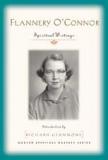Unconscious Theologian
Flannery O’Connor downplayed the deep spirituality that infused her life and her works. She is probably saying “Haw, haw, haw” in the southern backwoods accent that she sometimes affected as she views this new title in the Modern Spiritual Masters series.
The series introduces readers to inspiring religious leaders by presenting judiciously selected passages from their work. A sampling of the writers—all of whom write to express spiritual ideas—includes Dietrich Bonhoeffer, Henri Nouwen, Merton, Mother Teresa and Gandhi. O’Connor is the first fiction writer published in the series. Perhaps she is misplaced.
In his preface the editor Robert Ellsberg tells about meeting Flannery O’Connor through reading her letters, and how this literary encounter led to his conversion to Catholicism. So it is clear that, for him, O’Connor’s “spiritual writings” are powerful. In addition to choosing excerpts from her works, Ellsberg occasionally annotates them or clarifies and expands them with footnotes.
Richard Giannone introduces the volume with an extensive essay entitled “Flannery O’Connor’s Dialogue With the Age.” He states biographical facts, evaluates O’Connor’s novels and short story collections, alludes to her wide-ranging reading, mentions her book reviews and extols her letters. Asserting that “this collection charts a course through O’Connor’s spiritual insights,” he comments on each of the five sections of the book: “Christian Realism,” “Mother and Teacher,” “Revelation,” “A Reason to Write” and “The Province of Joy.”
The book draws from her letters, essays and fiction, with most weight given to her letters. Those included could be called “spiritual writings,” but they represent only a small sample of The Habit of Being, a lifetime of letters collected and sensitively annotated by the late Sally Fitzgerald, the friend who knew O’Connor best. In this source, one finds O’Connor alive: funny, cynical, amused, angry, curious, staunch against adversity, with a strong sense of the spiritual mixed in—higgledy-piggledy. By choosing only letters with spiritual themes, Ellsberg achieves the goal of the series; but such a focus presents a single-sided view of O’Connor’s personality.
Excerpts from O’Connor’s essays are subject to the same distortion. O’Connor states her views about fiction and faith clearly and persuasively in her essays, but excerpts from them lack the balance that she achieves, through humor, as she attempts to make her “Christ-haunted” fiction apprehensible to a nonbelieving world. The integral unity of her writing, both essays and fiction, demands a reading from beginning to end. Although the essence of her thought is communicated in the excerpts, the balance that the context would have provided is lost.
Least useful are the excerpts from her fiction. Selections ranging from eight lines to three pages from Wise Blood, The Violent Bear It Away and four short stories cannot stand alone; they are knitted into the fabric of the fiction and derive their meaning from every sentence of the narrative. A saving grace: the compendium contains one complete short story, “Revelation.” Here we have O’Connor at the top of her game: grounded in reality, hinting at race relations, illuminating the inbreak of grace, demonstrating the acceptance of grace, using “dreams and visions” to portray an inner world. The story begins in a doctor’s small waiting room and ends in the “pig parlor” of a family hog farm: absolute reality, magnificent transcendence.
But is “Revelation” a “spiritual writing”? In one of her essays, O’Connor states that “it is in the nature of fiction not to be good for much unless it is good in itself.” So “Revelation” is, first and foremost, a totally imagined and carefully constructed story, with a spiritual dimension that grows out of every sentence, every scene. The categories of fiction and spiritual writing may at times converge, but “Revelation” is essentially a well-wrought tale, created during the last round of O’Connor’s bout with lupus, which led to her death at age 39.
In the preface, Ellsberg puts an imprimatur on this volume which, despite all my caveats, I respect. He tells of his correspondence with Sally Fitzgerald, of her agreement to edit this book and of their mutual conviction “that Flannery O’Connor should be esteemed not simply as one of the great artists of our time, but as one of the great guides and companions of the spiritual life.” She endorsed his proposal to include O’Connor in the Modern Spiritual Masters series but died before she could undertake the work of editor.
Perhaps seekers after the spiritual will come to Flannery O’Connor as a “spiritual guide” and be led to the fullness of her fiction, her letters and her essays. If so, they will find an unconscious theologian, consciously creating a fictional world that is “spattered with the blood of redemption,” a witty and winning letter-writer and a plain-talking and wise essayist. If this book serves as an all-points-alert for new readers of O’Connor’s fiction, it will have served its purpose well.
This article also appeared in print, under the headline “Unconscious Theologian,” in the May 26, 2003, issue.








